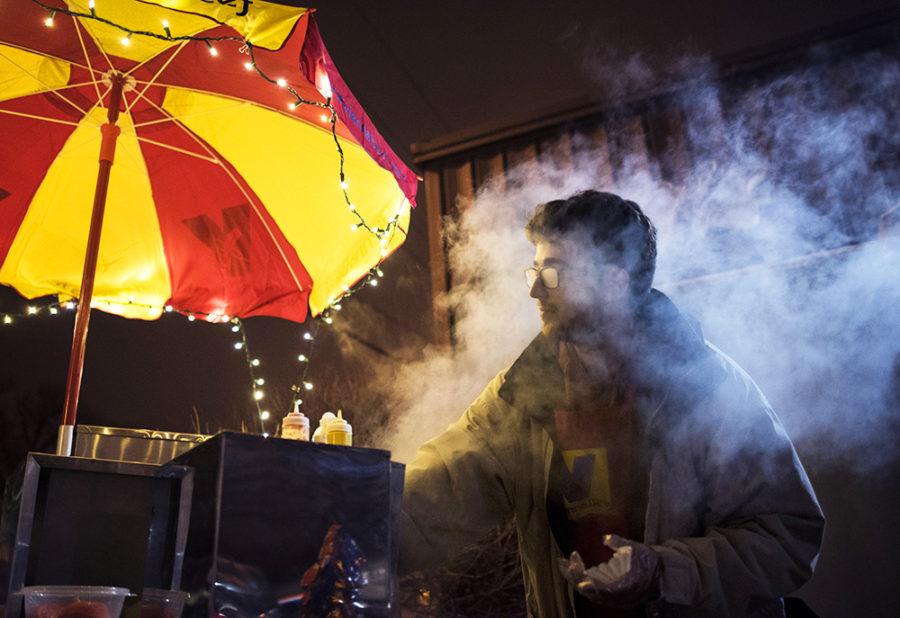Closure of economic development office would be ‘great disservice’ to community, business owners say
Chris Weatherwax, co-owner of Saluki Dawgs, battles the steam escaping from inside his hot dog cooker while preparing one of his specialty hot dogs for a customer Saturday, Feb. 18, 2017, by Pagliai’s Pizza on the Strip. Weatherwax and his friend Thomas Becker began the business in December and serve customers between 11 p.m. and 2:30 a.m. Fridays and Saturdays. Weatherwax credits Saluki Ventures, part of the Office of Economic and Regional Development, with helping them start and maintain their business. “Honestly, we wouldn’t be doing this if it weren’t for them,” Weatherwax said. “As far as getting locations, working with us to find out where we can go, who to talk to, they’ve been so helpful.” (Morgan Timms | @Morgan_Timms)
February 22, 2017
For SIU undergraduate Thomas Becker, owning his own business has been a goal since growing up on his family’s farm in McLeansboro.
That objective became a reality in December with the help of the Office of Economic and Regional Development. Now he and his business partner, recent SIU graduate Chris Weatherwax, can be seen moving a hot dog stand among three different Carbondale locations on Fridays and Saturdays.
“[The economic development center was] really the catalyst for us,” Becker said of starting their business, Saluki Dawgs. “There’s a lot of red tape in business, and they helped us cut through it.”
Advertisement
Becker said their business would have never gotten off the ground if he and Weatherwax didn’t have the guidance they received through Saluki Ventures, a program that supports student entrepreneurs.
This resource may soon be at risk. The Office of Economic and Regional Development — which has helped nearly 3,000 people with their business development in the last decade — is one of 15 centers or initiatives SIU’s non-academic prioritization committee suggested could become self supporting with the goal of eliminating state funding by 2022. This is expected to save the university $5.5 million in five years.
The Daily Egyptian is publishing a series of stories to examine the effect those proposed cuts would have on the university community. This is the fifth in the series.
University spokeswoman Rae Goldsmith said the Chancellor’s Planning and Budget Advisory Council met on Thursday with interim Chancellor Brad Colwell. The chancellor is expected to release the initial report to the campus community Thursday.
The non-academic prioritization committee suggested cutting $500,511 from the economic development center’s state funding, but its executive director, Kyle Harfst, said its state funding for 2017 fiscal year totaled $426,747.
Goldsmith said the numbers differ because SIU pulled salaries for vacant positions across campus during the continuing state budget impasse. These funds would be returned to units if they are given administrative approval to fill those vacancies, she said.
If those cuts were implemented, Harfst said the economic development center would shut down.
Advertisement*
“If that goes away, our office goes away,” Harfst said. “Under the current model, there’s just no way we could make it work.”
The center is projected to receive $2.2 million in state, federal and foundation grants this fiscal year. Most of these grants require a match from the university, which means if state funding is cut off, the center would be unable to pursue grant money.
Harfst said previous cuts have already begun to affect the center’s ability to serve students.
The economic development center, and specifically the Small Business Development Center, has also been operating with significantly reduced staff compared to the last few years, Harfst said. Three years ago, the center had 30 employees, including five graduate assistants and six student workers. There are 21 employees at the center now, including six student workers but no graduate assistants.
“If we keep up with these cuts, we lose the ability to be known as an innovative and entrepreneurial university,” Harfst said.
In 2015, the economic development center helped 34 businesses get off the ground or expand, and held 37 training seminars for 629 participants. During the last 10 years, the center has helped start or expand 504 businesses and helped 2,967 clients with their business development.
Harfst said local business outreach gives support to current and aspiring business owners through technical assistance, financial and expansion guidance and social media training.
One of those businesses is Thermaquatica, which uses an environmentally-friendly process to convert solid, low-quality waste products to high-value chemicals and products, said its founder and chief technology officer, Ken Anderson.
Using oxygen and water, Anderson and his team can run coal — valued at $10 or $15 a ton — through their process and within seconds, convert it into a water soluble liquid. The end product can be refined to help make plastics, and can sell for thousands of dollars a ton, he said.
Anderson, who has been a professor in the university’s geology department for more than 13 years, described the economic development center as a jewel in the crown. He said his business, which employees six people, would not exist without help from the center.
“The millions of dollars that have flowed into this region directly through Thermaquatica … would never have come here were it not for the opportunities that the [Small Business Development Center] gave us,” Anderson said.
Thermaquatica, which was created in 2010 after six years of researching the waste-converting process, is now patented worldwide, and its employees are involved in a multi-million dollar project with an Australian company. It is housed in the Dunn-Richmond Economic Development Center at 150 E. Pleasant Hill Road in the Research Park.
Anderson said he is not sure what would happen to Thermaquatica or where it would move if the center closes.
The Small Business Development Center was created to help promote the economic well-being of the region, Anderson said. It was connected to the university because it was convenient, he said, and already had all the resources needed to function.
Unlike the other institutes and centers that are facing cuts, Anderson said, the Small Business Development Center has a primarily community-oriented mission.
“The [Small Business Development Center] was never intended to be a university asset — it was a community asset,” he said. “If the university kills it, then the university is doing the community a great disservice.”
While he understands the university’s perspective, Anderson said it’s unfortunate the small business center could be jeopardized to protect SIU’s core mission.
“Unfortunately, the service aspect tends to be an easy target when teaching and research are threatened,” he said. “In this case, I think that would be short-sighted.”
Like Anderson, Mark Novoa, owner of Ground FX Flooring, which specializes in the sale and installation of flooring, said his business would not exist today without the center.
The company operates out of a 20,000 square-foot warehouse in Herrin and travels to customers’ homes in a 30-foot-long, air-conditioned trailer, which Novoa said is the largest mobile showroom for flooring in the country.
Novoa, who has been in the flooring business for more than 20 years, said the economic development center helped his company obtain a grant, establish a business plan and orchestrate its marketing strategy.
“It really has been a great tool for us, which is why it just kills me — the thought of [the economic development] being removed,” Novoa said. “All it’s going to do is hurt all the entrepreneurs that need that little push.”
The flooring business started with a $40,000 grant from Champion Community Investments, and since 2010, has grown to become a more than $600,000 a year company.
But for Novoa, a father of triplets, it’s not about the money, he said, but the 13 full-time contractors he employs.
“It was difficult for them to take a risk on a guy like me,” he said of the investors that work closely with the Small Business Development Center. “No money, nothing. Just a carpet layer with an idea.”
Harfst said the loss of the economic development center would hurt the larger community because there is no other place in the region that provides such extensive support for people who need help starting a business.
“We have a certain obligation beyond just providing for the young, talented adults at the university,” Harfst said. “We need that connection between the academic community and the region.”
Anderson said this kind of center is crucial, especially for southern Illinois.
“We’re in an economically depressed, rural region,” he said. “Getting new businesses established here is hard. … And the more difficult you make that, the smaller the crop of businesses will be.”
Staff writer Marnie Leonard can be reached at [email protected] or on Twitter @marsuzleo.
Staff writer Luke Nozicka can be reached at [email protected] or on Twitter @lukenozicka.
To stay up to date with all your southern Illinois news, follow the Daily Egyptian on Facebook and Twitter.
Advertisement









